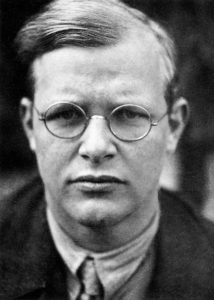Dietrich Bonhoeffer, Pastor and Anti-Nazi Dissident

Dates: 1906-1945
Locations: Germany; United States; England
Feast Day: April 9
Context: Dietrich Bonhoeffer was a German evangelical pastor, theologian, and anti-Nazi dissident. Born in Breslau, Germany in 1906, Bonhoeffer was raised in a large family by well-educated parents, who encouraged his academic pursuits. He studied theology at the universities of Tubingen and Berlin, as well as Union Theological Seminary in New York City. He returned to Germany and was ordained a Lutheran pastor. Soon afterwards, the Nazi Party rose to power in Germany. A Nazi pressure group known as the German Christian movement influenced German churches to adopt the anti-Semitic, racist, and anti-Judaic beliefs of Nazism. Bonhoeffer became a key member of the Confessing Church, a pan-denominational German church which opposed Nazi ideals. He helped run underground seminaries which trained ministers for the Confessing Church. Around this time, Bonhoeffer wrote his most notable work, The Cost of Discipleship, a study of the Sermon on the Mount. He eventually became a member of the Abwehr, a German military intelligence organization. He posed as a pastor whose ecumenical contacts would be useful for the Nazi Party. In reality, he worked as a spy and was involved in the July 20 plot to assassinate Hitler. Bonhoeffer did not make this decision lightly—he waited years for the situation in Germany to develop, and thought through the ethical and theological implications of assassinating someone, even someone as wicked as Hitler. The plot failed, and Bonhoeffer was arrested and imprisoned. He was eventually transferred to Buchenwald and then finally to the Flossenburg concentration camp, where he was hanged to death on April 9, 1945. One of the main emphases of Bonhoeffer’s theology is that while salvation is entirely an unearned gift, it is a costly gift. Bonhoeffer opposed a “cheap grace” which offered forgiveness of sins and eternal life, but without any of the demands of discipleship to Jesus.
Excerpt from The Cost of Discipleship (1948)
Cheap grace… is grace without price; grace without cost! The essence of grace, we suppose, is that the account has been paid in advance; and, because it has been paid, everything can be had for nothing. In such a Church the world finds a cheap covering for its sins; no contrition is required, still less any real desire to be delivered from sin. Grace alone does everything they say, and so everything can remain as it was before. Well, then, let the Christian live like the rest of the world, let him model himself on the world’s standards in every sphere of life, and not presumptuously aspire to live a different life under grace from his old life under sin. Cheap grace is the preaching of forgiveness without requiring repentance, baptism without church discipline, Communion without confession. Cheap grace is grace without discipleship, grace without the cross, grace without Jesus Christ, living and incarnate.
Costly grace is the gospel which must be sought again and again and again, the gift which must be asked for, the door at which a man must knock. Such grace is costly because it calls us to follow, and it is grace because it calls us to follow Jesus Christ. It is costly because it costs a man his life, and it is grace because it gives a man the only true life. It is costly because it condemns sin, and grace because it justifies the sinner. Above all, it is costly because it cost God the life of his Son: “ye were bought at a price,” and what has cost God much cannot be cheap for us. Above all, it is grace because God did not reckon his Son too dear a price to pay for our life, but delivered him up for us. Costly grace is the Incarnation of God.
Discussion Questions:
- Why do you think the Church is sometimes tempted to preach cheap grace, as Bonhoeffer describes it?
- In what ways is following Jesus a costly endeavor? What does being a follower of Christ cost you?
- If we kept in mind the great price Jesus paid to redeem us, how would that affect the way we live our everyday lives?


Comments are closed.